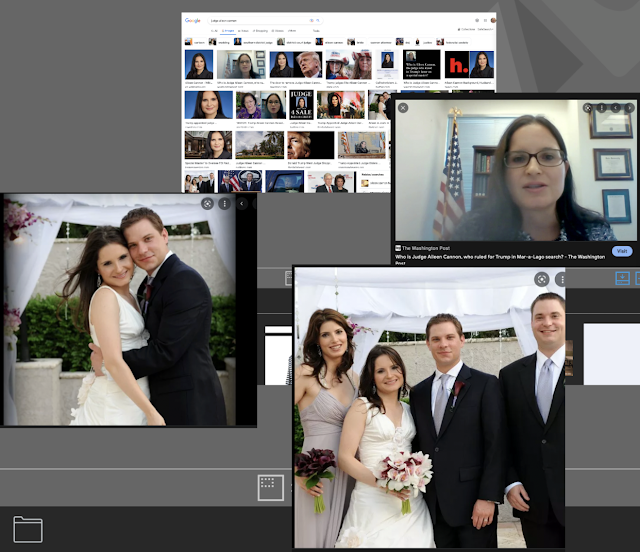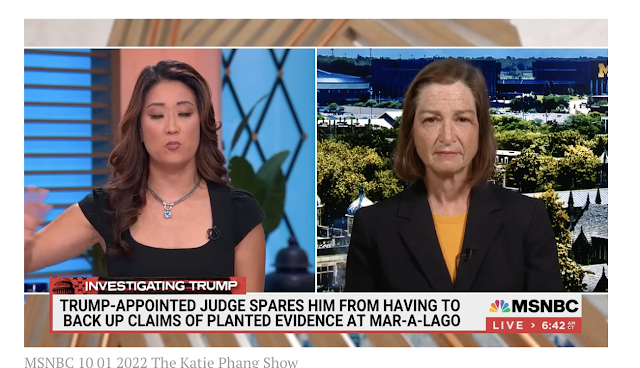The whole Truth?
Ginni says generally, not never
by Hal Brown
Related articles on bottom of page
Click to enlarge image
The horrible housfrau Thomas' choice of the word "generally" in her testimony to the Jan. 6th Committee jumped out at me:
 |
| The words quoted in her prepared remarks sound as if they were prepared by lawyers to avoid her perjuring herself. |
This is from CNN.
“Regarding the 2020 election, I did not speak with him at all about the details of my volunteer campaign activities,” Thomas said under oath in her opening statement obtained by CNN. “And I did not speak with him at all about the details of my post-election activities, which were minimal, in any event. I am certain I never spoke with him about any of the legal challenges to the 2020 election, as I was not involved with those challenges in any way.”
Thomas’ prepared remarks, however, stressed, “that my husband has never spoken with me about pending cases at the Court. It’s an iron clad rule in our home.”
“Additionally, [Justice Thomas] is uninterested in politics. And I generally do not discuss with him my day-to-day work in politics, the topics I am working on, who I am calling, emailing, texting, or meeting,” she added.
‘The View’ Hosts ‘Call B.S.’ on Ginni Thomas’ Claims She Doesn’t Talk Politics With Her Husband: ‘A Filthy Liar’
“Excerpts:
I think Ginni Thomas is a little bit of a filthy liar,” (co-host) Hostin said. “And the reason that I say that is because she says ‘We don’t talk about politics. We don’t talk about the Supreme Court…'” At that, Joy Behar cut her off, asking “What do they talk about, ‘Dancing With the Stars?'”
Hostin brought that up because there is indeed a thread between former clerks of Judge Thomas — which his wife is not only on, but “she plans family retreats for everyone” in it. Hostin also pointed out that one of those former clerks is John Eastman, who was, of course, one of the biggest testimonies in the Jan. 6 hearings.
“So Ginni, come on girl,” Hostin said cheekily.
Host Alyssa Farah Griffin also admitted that she’d “call B.S.” on Thomas’ claims that the Thomases don’t discuss their work, arguing that at the very least, Judge Thomas might ask his wife how her day was, or if she did anything exciting — including on Jan. 6, when his wife was at the Capitol.
“Is she a liar, or is she in the cult?” Behar wondered. But to that, host Ana Navarro had a blunt answer.
“Honey, she’s cray cray,” Navarro shot back. “This is not hard to figure out. First of all, since they’re not talking about politics, and they’re not talking about legal cases, maybe they’re the ones talking about Bruno.”
At Behar’s obvious confusion, Navarro clarified that she was referencing the viral song from Disney’s “Encanto,” before getting into her true thoughts on Ginni Thomas.
“I think she is representative of people who are somewhat radicalized, or totally radicalized, who are not rooted in fact, and who are crazy,” she said. “But I don’t think Ginni Thomas is a mastermind behind this conspiracy. I think she is one of those annoying gadflies that they had to deal with because she happens to be married to a Supreme Court justice that they needed.”
....and this:
"As we talk about and think of the rigged and stolen of 2020 — presidential election, rigged and stolen — I would like to thank a great woman named Ginni Thomas. Do you know Ginni Thomas? Great woman."As someone who was a psychotherapist for 40 years I try to have empathy for people like this woman because she was vulnerable to being manipulated like so many others who got sucked into the Trump cult and other far smaller cults in previous times. It is sad that instead of MAGA hats in another context they could be wearing tinfoil on their heads to prevent outer-space rays from frying their brains.
Lawyer claims Trump could get away with financial lies because there was a disclaimer
The Supreme Court Is Blowing Up Law School, Too
Inside the growing furor among professors who have had enough.
At law schools across the country, thousands of professors of constitutional law are currently facing a court that, in their view, has let the mask of neutrality fall off completely. Six conservative justices are steering the court head-on into the most controversial debates of the day and consistently siding with the Republican Party. Increasingly, the conservative majority does not even bother to provide any reasoning for its decisions, exploiting the shadow docket to overhaul the law without a word of explanation. The crisis reached its zenith between September 2021 and June 2022, when the Supreme Court let Texas impose its vigilante abortion ban through the shadow docket, then abolished a 50-year-old right to bodily autonomy by overruling Roe v. Wade. Now law professors are faced with a quandary: How—and why—should you teach law to students while the Supreme Court openly changes the meaning of the Constitution to align with the GOP?A version of this question has long dogged the profession, which has fought over the distinction between law and politics for about as long as it has existed. For decades, however, the court has handed enough victories to both sides of the political spectrum that it has avoided a full-on academic revolt against its legitimacy. That dynamic changed when Trump appointed Justices Brett Kavanaugh and Amy Coney Barrett to replace far less conservative predecessors and created a Republican-appointed supermajority, a coalition further aided by the appointment of Neil Gorsuch to a seat that should have been filled by Barack Obama. The cascade of far-right rulings in 2022 confirmed that the new court is eager to shred long-held precedents it deems too liberal as quickly as possible. The pace and scale of this revolution is requiring law professors to adapt on several levels—intellectually, pedagogically, and emotionally.---------The problem, it’s worth emphasizing, is not that the Supreme Court is issuing decisions with which left-leaning professors disagree. It’s that the court seems to be reaching many of these conclusions in defiance of centuries of standards, rejecting precedent and moderation in favor of aggressive, partisan-tinged motivated reasoning. Plenty of progressive professors have long viewed the court with skepticism, and many professors, right- and left-leaning, have criticized the reasoning behind certain opinions for decades. But it’s only in recent years—with the manipulation of the justice selection process combined with clear, results-oriented cynicism in decisions—that the problem has seemed so acute that they feel it affects their ability to teach constitutional law.







































